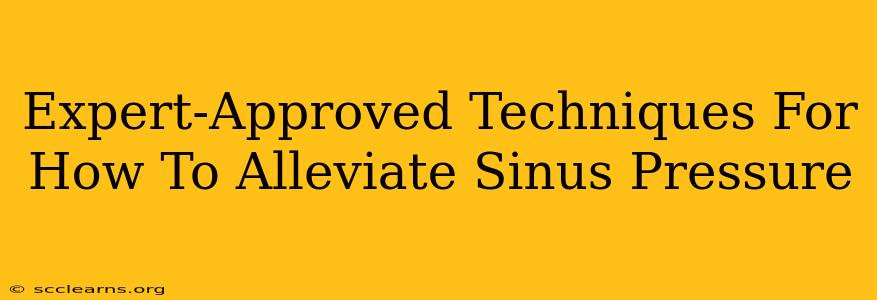Sinus pressure – that agonizing feeling of fullness and pain in your head – can make even the simplest tasks feel unbearable. But relief is possible! This expert-approved guide outlines effective techniques to alleviate sinus pressure and get you feeling better fast. We’ll cover everything from home remedies to medical interventions, empowering you to manage your sinus discomfort effectively.
Understanding Sinus Pressure: Causes and Symptoms
Before diving into solutions, it's crucial to understand the root of the problem. Sinus pressure typically arises from inflammation and swelling in the sinuses, air-filled cavities located behind your forehead, cheeks, and eyes. This inflammation can be triggered by various factors, including:
- Viral or bacterial infections: Common colds, the flu, and sinusitis (sinus infection) are primary culprits.
- Allergies: Exposure to allergens like pollen, dust, and pet dander can trigger inflammation.
- Environmental factors: Dry air, sudden temperature changes, and air pollution can irritate the sinuses.
- Nasal polyps: These benign growths in the nasal passages can obstruct airflow and contribute to pressure.
- Dental infections: In some cases, infections in the teeth or gums can spread to the sinuses.
Common symptoms associated with sinus pressure include:
- Facial pain and pressure: This is the hallmark symptom, often felt in the forehead, cheeks, and around the eyes.
- Headache: Sinus pressure frequently causes headaches, ranging from mild to severe.
- Congestion: Stuffy nose and difficulty breathing through the nose are common.
- Postnasal drip: Mucus dripping down the back of the throat can cause a sore throat and coughing.
- Fever: Fever is a common symptom of sinus infections.
- Facial tenderness: Touching the face near the sinuses might cause pain or tenderness.
Home Remedies for Immediate Sinus Pressure Relief
Several home remedies can provide quick relief from sinus pressure. These methods are generally safe and easy to incorporate into your daily routine:
Hydration is Key:
Drink plenty of fluids: Water, herbal tea, and clear broths help thin the mucus, making it easier to drain. Staying hydrated is paramount for effective mucus clearance.
Saline Nasal Rinse:
A saline nasal rinse (using a neti pot or saline spray) can effectively flush out irritants and mucus from the nasal passages, providing immediate relief from congestion and pressure. Make sure to use distilled or sterile water to avoid infections.
Steam Inhalation:
Inhaling steam can help loosen congestion. Simply add a few drops of eucalyptus or peppermint essential oil to a bowl of hot water, cover your head with a towel, and inhale the steam for 10-15 minutes. Caution: Be careful not to burn yourself.
Warm Compress:
Applying a warm compress to your forehead or sinuses can soothe pain and inflammation. Use a clean, damp washcloth heated in the microwave or with warm water.
Elevate Your Head:
Sleeping with your head elevated on an extra pillow can help drain mucus and reduce pressure.
Medical Interventions for Persistent Sinus Pressure
If home remedies fail to provide relief, or if your symptoms worsen, it's essential to seek medical attention. Your doctor can diagnose the underlying cause of your sinus pressure and recommend appropriate treatment, including:
- Decongestants: Over-the-counter decongestants can help reduce swelling and improve drainage. However, prolonged use is not recommended.
- Nasal corticosteroids: These nasal sprays reduce inflammation and are often more effective than decongestants for long-term management.
- Antibiotics: If a bacterial infection is suspected, your doctor may prescribe antibiotics.
- Surgery: In rare cases, surgery might be necessary to correct structural problems in the sinuses, such as nasal polyps or deviated septum.
Preventing Future Sinus Pressure
Proactive measures can significantly reduce your risk of experiencing sinus pressure:
- Manage allergies: Identify and avoid allergens, use allergy medications as needed, and consider immunotherapy.
- Maintain good hygiene: Wash your hands frequently to avoid infections.
- Quit smoking: Smoking irritates the sinuses and increases your susceptibility to infections.
- Stay hydrated: This is crucial for maintaining healthy mucus membranes.
- Avoid exposure to irritants: Minimize exposure to air pollution, dust, and other irritants.
By understanding the causes of sinus pressure, employing effective relief techniques, and practicing preventative measures, you can significantly improve your quality of life and minimize the impact of this uncomfortable condition. Remember to consult your healthcare provider for any persistent or severe symptoms. They can provide a personalized diagnosis and treatment plan tailored to your specific needs.

